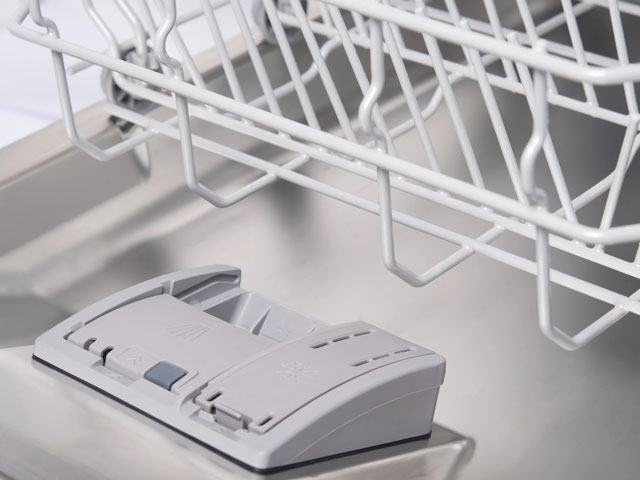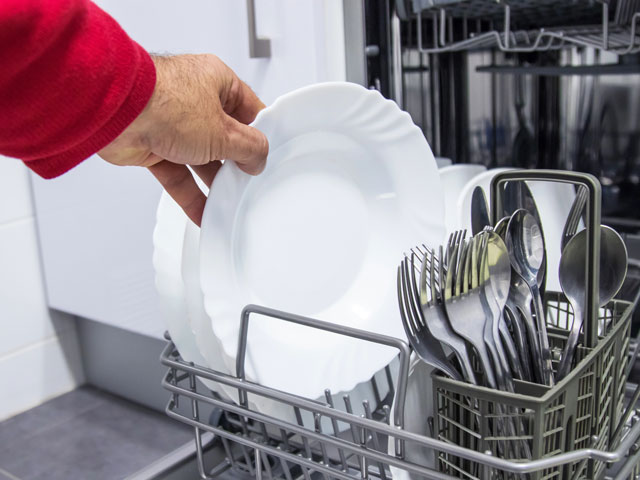Can You Use Dish Soap in a Dishwasher?
Let's face it, you've run out of detergent and thought, what if I just use the dish soap that's on hand. It seems like a simple solution, but is it really safe?

Let's face it, you've run out of detergent and thought, what if I just use the dish soap that's on hand. It seems like a simple solution, but is it really safe?
Well, we're here to tell you that using dish soap in a dishwasher isn’t advisable. It's just not how that type of soap works. Dish soap creates excessive suds, leading to overflow and potential flooding. Such foam can cause the dishwasher’s sensors to malfunction, affecting the washing cycle.
In fact, dish soap differs significantly from dishwasher detergent. Dishwasher detergents contain specific enzymes and surfactants designed for automated cleaning. These ingredients target food particles and grease without generating excessive bubbles. Ever see a slapstick movie where the kitchen is covered in suds?
Go down this route and buckle up.
Understanding Dish Soap and Dishwasher Detergents
Dish soap and dishwasher detergents serve different purposes, though they both aid in cleaning dishes. Recognizing their distinctions is crucial for effective dishwashing and appliance maintenance.
- Formulation: Dish soap typically contains surfactants designed for handwashing, which create substantial suds. In contrast, dishwasher detergents contain specialized enzymes and surfactants that target food residues without excessive bubbling.
- Suds Production: Dish soap generates abundant bubbles, which can overwhelm the dishwasher. Dishwasher detergents minimize suds to maintain optimal washing conditions.
- Cleaning Mechanism: Dish soap relies on foaming action for cleaning, suitable for manual scrubbing. Dishwasher detergents use a combination of enzymes that break down food particles and dirt during the wash cycle, providing deeper cleaning.
- Rinse Process: Dish soap often leaves a film on dishes requiring thorough rinsing. Dishwasher detergents rinse away cleanly, preventing residue on glassware and utensils.
- Compatibility with Appliances: Dish soap can damage internal components of dishwashers, disrupting sensors and drainage systems. Dishwasher detergents are manufactured specifically for use in these machines, ensuring safe functionality.

The Risks of Using Dish Soap in a Dishwasher
Using dish soap in a dishwasher poses significant risks. The primary concerns involve excessive suds and potential damage to the appliance.
Excessive Suds and Overflow
Dish soap creates ample suds that quickly fill the dishwasher. When these bubbles overflow, they can leak out of the appliance, causing a mess on the floor. This excessive sudsing disrupts the washing cycle, making it difficult for sensors to function properly. As a result, the dishwasher may not clean dishes effectively, leading to residue or food particles remaining on the dishes. Keeping this in mind, it's crucial to avoid using dish soap entirely for the best results.
Potential Damage to Dishwasher Components
Using dish soap can compromise various internal components of a dishwasher. The built-in motors and pumps face strain due to the overwhelming bubbles. This stress can lead to mechanical failures, such as clogs in the drainage system or damage to the spray arms. Additionally, the soapy residue may build up in filters, requiring costly repairs or replacements. Prioritizing the use of dishwasher detergent protects the appliance and ensures it operates at optimal efficiency.
Sensor Disruption
Many dishwashers contain sensors that detect when the cycle completes. Suds interfere with these sensors, causing the machine to malfunction or run inefficient cycles.
Cleaning Inefficiency
Although a small amount of dish soap may seem harmless, it compromises the cleaning process, leading to the need for re-washing and increasing water usage.
What happens if I accidentally use dish soap?
- Stop the dishwasher immediately
- Run a rinse cycle to remove suds and prevent overflow.
- Clean up any mess to avoid damage to the machine’s internal components.
Options for Cleaning Products & Eco-Friendly Alternatives
Detergents
Here are some decent options for those in need. Each of these detergents is specifically formulated for dishwashers, minimizing the risk of suds and ensuring proper machine function.
- Cascade Platinum: Known for cutting through tough stains and food residues, it contains powerful enzymes and the soap works effectively in all water temperatures.
- Finish Quantum: This product features a 3-in-1 technology that cleans, shines, and protects dishes. Its fast-dissolving tablets leave behind no residue.
- Seventh Generation Free & Clear: This eco-friendly option is free of dyes and fragrances, making it suitable for sensitive individuals while still delivering strong cleaning power.
Alternatives
Here are some typical household items that reduce chemical exposure and provide a more eco-friendly experience
- Baking Soda: Acts as a natural abrasive, helping to scrub dishes while eliminating odors. Use about one cup per load for best results.
- Vinegar: Functions as a natural rinse aid. Add one cup to the bottom of the dishwasher before running a cycle to enhance shine and remove grease.
- Lemon Juice: Offers a fresh scent and natural cleaning properties. Integrating a few tablespoons into your wash can help cut grease and leave plates sparkling.